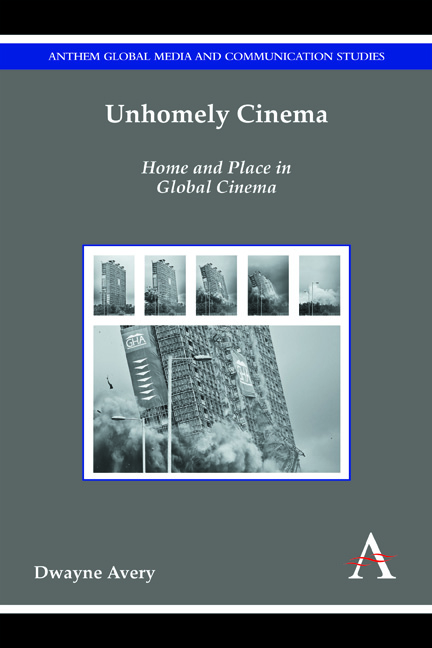Book contents
- Frontmatter
- Contents
- Introduction Unhomely Cinema
- Chapter 1 An Unhomely Theory
- Chapter 2 The Decline of the Family: Home and Nation in Krzysztof Kieślowski's The Decalogue
- Chapter 3 The Future Is behind You: Global Gentrification and the Unhomely Nature of Discarded Places
- Chapter 4 No Place to Call Home: Work and Home in Paul Thomas Anderson's Punch Drunk Love and Jason Reitman's Up in the Air
- Chapter 5 The Terrible Lightness of Being Mobile: Cell Phone and the Dislocation of Home
- Chapter 6 Unhomely Revolt in Laurent Cantet's Time Out
- Conclusion
- References
- INDEX
Chapter 6 - Unhomely Revolt in Laurent Cantet's Time Out
Published online by Cambridge University Press: 05 November 2014
- Frontmatter
- Contents
- Introduction Unhomely Cinema
- Chapter 1 An Unhomely Theory
- Chapter 2 The Decline of the Family: Home and Nation in Krzysztof Kieślowski's The Decalogue
- Chapter 3 The Future Is behind You: Global Gentrification and the Unhomely Nature of Discarded Places
- Chapter 4 No Place to Call Home: Work and Home in Paul Thomas Anderson's Punch Drunk Love and Jason Reitman's Up in the Air
- Chapter 5 The Terrible Lightness of Being Mobile: Cell Phone and the Dislocation of Home
- Chapter 6 Unhomely Revolt in Laurent Cantet's Time Out
- Conclusion
- References
- INDEX
Summary
Introduction
Laurent Cantet's Time Out (L'Emploi du Temps) is an eerie and uncanny film that explores contemporary working conditions in France and the desperate, even psychotic lengths some will go to in order to maintain their identities as working members of society. Like his first feature film, Human Resources (Ressources Humaines), which examined capitalism's role in disrupting and dividing working-class families, Time Out explores the detrimental effects unemployment has on an upper-middle-class family, as Vincent, the film's protagonist, spirals out of control when he loses his job and decides to concoct a make-believe position at the United Nations. As films that explore the insidious effect capitalistic work has on the home, Time Out and Human Resources offer insight into the unhomely reality of contemporary estrangement. Indeed, while in Time Out Cantet moves away from the issue of working-class injustice, the film can nonetheless be read in terms of the Marxist concept of alienation. As Bert Cardullo writes,
Without any plan to protect himself, with no rational reaction to his situation or prospects, Vincent thereby reveals himself, in this film that is hardly a Marxist tract, to be a white-collar instance of alienated, blue-collar, capitalist labor: someone, according to Marx, who produces something that is alien to him and his life; becomes alienated from himself because his work is not part of his life or takes it over entirely; and who, as a result, finds himself alienated from other human beings, with whom he no longer shares a social essence or of whose society he no longer feels a part. (2003, 348)
- Type
- Chapter
- Information
- Unhomely CinemaHome and Place in Global Cinema, pp. 111 - 126Publisher: Anthem PressPrint publication year: 2014

